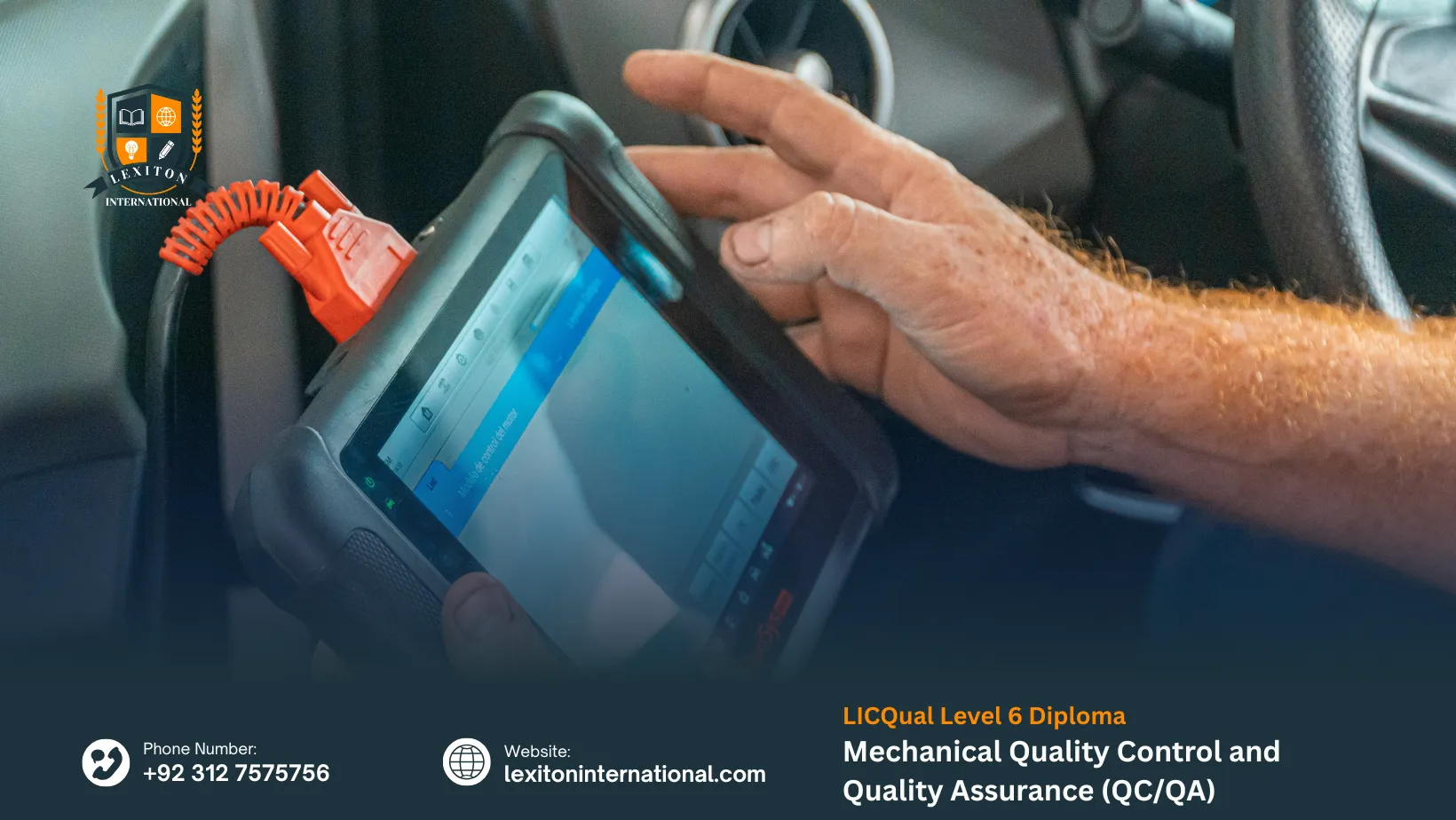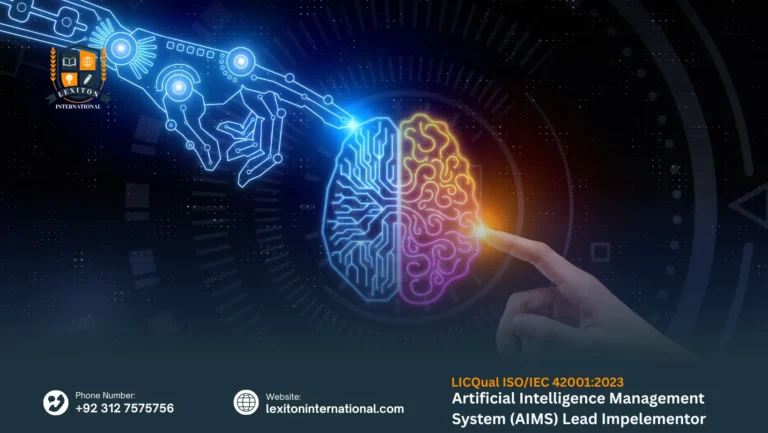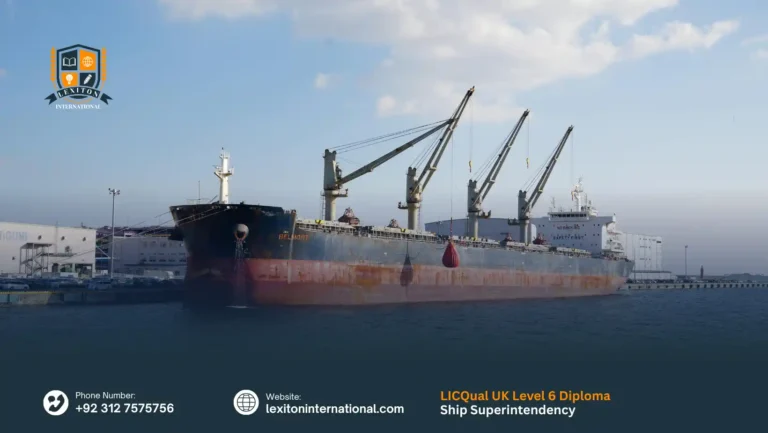The LICQual Level 6 Diploma in Mechanical Quality Control and Quality Assurance (QC/QA) is a globally recognised qualification designed to equip mechanical engineers and industry professionals with the advanced knowledge and practical expertise needed to excel in quality management roles. This diploma focuses on ensuring that learners develop strong technical, analytical, and leadership skills to manage, implement, and oversee QC/QA processes across a wide range of mechanical engineering projects.
What makes this programme unique is its combination of industry-specific mechanical engineering knowledge with internationally recognised QC/QA practices. Learners gain in-depth understanding of mechanical testing, inspection methods, risk management, root cause analysis, and compliance with global standards such as ISO and ASME. By bridging theoretical concepts with real-world applications, the course prepares professionals to confidently tackle quality challenges, enhance operational efficiency, and lead mechanical quality teams with credibility and authority.
Whether you are an experienced engineer aiming to move into a senior role or a professional seeking to specialise in quality assurance and control, this diploma offers a clear pathway to career advancement. Graduates are well-positioned for roles such as Quality Control Engineer, QA Manager, Mechanical Inspector, or Compliance Specialist, both locally and internationally. With its rigorous structure and global recognition, the LICQual Level 6 Diploma in Mechanical QC/QA sets the foundation for long-term success in the ever-evolving mechanical engineering industry.
To enroll in the LICQual Level 6 Diploma in Mechanical Quality Control and Quality Assurance (QC/QA), applicants must meet the following criteria:
- Minimum Age
Applicants must be at least 16 years old at the time of enrolment. - Educational Qualifications
A Level 4 or Level 5 qualification in Mechanical Engineering, Quality Management, or a related technical field is required. A bachelor’s degree in mechanical engineering or a similar discipline is also accepted. - Work Experience
Relevant work experience in mechanical engineering, QC/QA, or quality management is considered an advantage. Candidates with two or more years of professional experience are highly encouraged to apply. - Technical and Analytical Skills
Learners should have a basic understanding of mechanical engineering principles, including materials, mechanical systems, and inspection/testing methods, along with strong analytical skills. - Language Proficiency
Since the programme is delivered and assessed in English, applicants should have sufficient proficiency in English to meet the learning and assessment requirements.
Mandatory Units
This qualification, the LICQual Level 6 Diploma in Mechanical Quality Control and Quality Assurance (QC/QA), consists of 6 mandatory units.
Upon successful completion of this diploma, learners will be able to:
1. Quality Management Systems (QMS) in Mechanical Engineering
- Understand the core principles, frameworks, and objectives of Quality Management Systems (QMS) in mechanical engineering.
- Evaluate the application of QMS standards (e.g., ISO 9001) to ensure product quality and system reliability.
- Analyze the integration of QMS practices in mechanical engineering projects to meet customer and regulatory requirements.
- Design quality management strategies tailored to mechanical engineering processes and manufacturing workflows.
- Implement continuous monitoring and feedback mechanisms to enhance QMS performance in mechanical operations.
2. Mechanical Testing and Evaluation Methods
- Understand the principles and objectives of mechanical testing methods, including destructive and non-destructive testing techniques.
- Demonstrate the ability to conduct mechanical tests (e.g., tensile, hardness, fatigue) and interpret their results.
- Analyze test data to assess material properties, performance characteristics, and suitability for specific applications.
- Evaluate the effectiveness of various mechanical testing techniques in identifying defects and ensuring product quality.
- Apply advanced testing technologies to optimize mechanical system design and functionality.
3. Failure Analysis and Root Cause Investigation
- Understand the principles and methodologies of failure analysis in mechanical systems and components.
- Identify common failure modes in mechanical engineering, such as fatigue, corrosion, and wear.
- Apply root cause analysis (RCA) techniques to diagnose and address failures in mechanical systems (e.g., Fishbone Diagram, Fault Tree Analysis).
- Evaluate the impact of identified failure causes on system performance, safety, and operational continuity.
- Develop and implement corrective actions and preventive measures to minimize recurrence and enhance system reliability.
4. Risk Management and Quality Control Strategies
- Understand the principles of risk assessment and quality control in mechanical engineering contexts.
- Identify potential risks associated with mechanical systems and processes, including operational, safety, and environmental risks.
- Analyze and prioritize risks using tools such as FMEA (Failure Mode and Effects Analysis) and risk matrices.
- Design and implement effective quality control measures to mitigate risks and ensure product compliance.
- Evaluate the effectiveness of risk management and quality control strategies in improving mechanical system performance.
5. Advanced Quality Assurance and Process Improvement
- Understand the role of advanced quality assurance (QA) techniques in mechanical engineering projects.
- Apply statistical tools (e.g., Six Sigma, SPC) to monitor and improve process efficiency and product quality.
- Analyze process performance data to identify areas for improvement in mechanical manufacturing and design workflows.
- Develop and implement strategies for continuous process improvement, including lean manufacturing and agile practices.
- Evaluate the impact of quality assurance initiatives on overall system productivity, cost-effectiveness, and customer satisfaction.
6. International Standards and Regulatory Compliance in Mechanical Engineering
- Understand the international standards governing mechanical engineering practices (e.g., ISO 14001, ASME codes).
- Analyze the regulatory requirements for mechanical systems and their implications for global compliance.
- Demonstrate knowledge of the certification processes for mechanical products and systems according to international standards.
- Evaluate the risks and consequences of non-compliance in mechanical engineering practices.
- Apply compliance frameworks to ensure adherence to safety, environmental, and operational standards in mechanical engineering projects.
The LICQual Level 6 Diploma in Mechanical Quality Control and Quality Assurance (QC/QA) is designed for a wide range of learners and professionals who want to advance their careers in mechanical engineering and quality management. Whether you are a fresh graduate, an experienced engineer, or even an organisation aiming to strengthen its workforce, this diploma provides the knowledge and international recognition needed to succeed. The course is tailored to support career growth, enhance technical expertise, and open global opportunities in industries where quality control and assurance are critical.
Mechanical Engineers Seeking Career Growth
- Professionals working in the mechanical engineering field who want to specialise in quality control and assurance.
- Engineers aiming to strengthen their knowledge of mechanical testing, inspection, and compliance procedures.
- Individuals looking to enhance both technical and managerial expertise for career advancement.
- Engineers aspiring to move into supervisory or leadership positions within QC/QA departments.
- Professionals who want to increase their value in industries such as oil & gas, energy, construction, and manufacturing.
- Engineers aiming to keep up with the latest global quality standards and practices.
- Those seeking recognition through an internationally accredited diploma.
- Individuals wanting to improve career stability and long-term employability in quality management.
Quality Control & Quality Assurance Professionals
- QC/QA inspectors and auditors already working in the field who want to upgrade their qualifications.
- Supervisors aiming to develop advanced knowledge of international standards like ISO, ASME, and ASTM.
- Professionals keen on mastering failure analysis, root cause identification, and corrective actions.
- Individuals who want to strengthen their expertise in quality documentation, audits, and compliance.
- Those working in quality departments seeking career progression into senior roles.
- Professionals interested in expanding their knowledge of risk management and process optimisation.
- Employees wanting to validate their experience with a recognised international diploma.
- QC/QA staff looking to broaden their career opportunities in global markets.
Recent Graduates in Engineering Fields
- Graduates holding a bachelor’s degree or equivalent in mechanical or related engineering fields.
- Fresh graduates who want to build a strong foundation in QC/QA to stand out in competitive job markets.
- Students looking for a career-focused qualification that adds immediate employability value.
- Young professionals aiming to specialise early in quality management and assurance.
- Graduates seeking opportunities in industries where QC/QA is critical, such as manufacturing, energy, and oil & gas.
- Learners who want to gain practical, industry-relevant knowledge in addition to theoretical engineering studies.
- Students aspiring to pursue international roles by acquiring a globally recognised qualification.
- Those planning to progress into postgraduate studies in engineering or quality management.
Industry Practitioners & Technical Staff
- Skilled technicians working in mechanical workshops or production facilities.
- Supervisors involved in equipment maintenance, assembly, and inspection who want to expand into QA/QC.
- Plant operators or staff engaged in production processes aiming to transition to quality management roles.
- Technical staff looking to understand international compliance and quality assurance standards.
- Experienced professionals wanting to formalise their practical knowledge with an accredited diploma.
- Staff aiming to develop documentation, reporting, and auditing skills for QA/QC.
- Employees seeking promotion into quality-focused leadership positions.
- Individuals who want to shift from operational work to strategic and management responsibilities in QA/QC.
Professionals Seeking International Opportunities
- Engineers and QC/QA professionals looking for global career growth in industries like oil & gas, petrochemicals, power plants, and manufacturing.
- Individuals aiming to work in countries with strict QC/QA regulations and compliance requirements.
- Professionals seeking to enhance employability for overseas job applications and visa sponsorships.
- Candidates aiming to align their expertise with global standards and international best practices.
- Employees working in multinational organisations who want to gain globally recognised certifications.
- Professionals looking to increase competitiveness in international recruitment markets.
- Engineers aiming for senior-level quality roles abroad with higher responsibilities.
- Individuals seeking a portable qualification that remains valid and respected across different regions.
Career Changers Entering Mechanical QC/QA
- Professionals from related industries who want to shift into mechanical quality management roles.
- Individuals with practical engineering or technical backgrounds seeking formal recognition in QC/QA.
- Career changers looking for new opportunities in a high-demand and stable field.
- Employees from fields such as civil, electrical, or industrial engineering aiming to transition into mechanical QC/QA.
- People motivated to pursue career paths that offer long-term growth and international opportunities.
- Mid-career professionals seeking to diversify their skills and move into quality management.
- Individuals who want to align their experience with the needs of global quality-driven industries.
- Those interested in moving from hands-on technical roles to strategic and supervisory positions.
Organisations & Employers Supporting Staff Development
- Companies looking to upskill their workforce in quality assurance and control.
- Employers aiming to certify their staff with an internationally recognised qualification.
- Businesses seeking to improve internal quality management systems through staff training.
- Organisations that need employees trained to meet ISO, ASME, and international compliance standards.
- Employers wanting to enhance workplace efficiency, safety, and customer satisfaction.
- Companies looking to develop quality-focused leaders from within their existing workforce.
- Firms involved in large-scale mechanical projects requiring qualified QC/QA specialists.
- Organisations that want to ensure sustainable quality assurance practices across departments.
Completing the LICQual Level 6 Diploma in Mechanical QC/QA opens up a wide range of exciting academic and career opportunities. This qualification is designed not only to enhance your immediate career prospects but also to prepare you for advanced studies and global leadership roles in quality management. Learners can progress to higher education pathways, specialised certifications, and senior positions in industries where quality assurance and compliance are critical.
Progression to Higher Qualifications
- Eligible to enrol in Level 7 Diplomas in Engineering, Management, or Quality-related fields.
- Opportunities to specialise further in industrial quality engineering or project management.
- Academic routes for those aiming to pursue doctoral research (PhD) in mechanical or quality engineering.
- Access to international postgraduate programmes at universities worldwide.
- Recognition of credits towards further professional or academic qualifications.
- Ability to combine quality assurance expertise with business management qualifications.
- Expansion into cross-disciplinary fields like supply chain quality and manufacturing systems management.
Professional Career Advancement
- Move into senior-level roles such as QC Manager, QA Lead, or Compliance Specialist.
- Qualification supports applications for international jobs in oil & gas, power, manufacturing, and construction.
- Increased eligibility for managerial and supervisory positions in quality assurance.
- Recognition by employers as an advanced qualification aligned with global industry standards.
- Development of advanced leadership skills for decision-making positions.
- Enhanced credibility when applying for consultancy or contract roles.
- Stronger professional profile for promotions within your current organisation.
- Readiness for leadership in quality-focused industrial projects.
Pathway to Professional Certifications
- Eligibility to pursue international quality certifications (e.g., ASQ Certified Quality Engineer, CQE).
- Recognition as a strong foundation for ISO Lead Auditor courses.
- Ability to progress into specialised certifications like Six Sigma (Green Belt/Black Belt).
- Alignment with international compliance standards across industries.
- Opportunities to earn membership in professional engineering bodies.
- Increased ability to qualify for international licensing exams.
- Formal recognition of knowledge for industry-specific regulatory requirements.
- Enhanced preparation for quality and safety certifications in high-risk industries.
Expansion into Global Opportunities
- Access to career prospects in multinational organisations worldwide.
- Qualification supports relocation opportunities to countries with strict QC/QA compliance.
- International recognition that boosts employability in competitive job markets.
- Stronger applications for work visas requiring certified technical qualifications.
- Ability to transition into global consultancy roles in mechanical QC/QA.
- Recognition across industries such as oil & gas, aviation, marine, energy, and automotive.
- Preparedness for remote and international project management positions.
- Enhanced reputation as a globally trained QC/QA specialist.
Curious About This Course?







